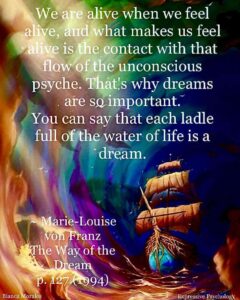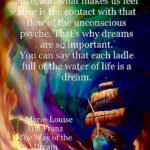Intellectually the Self is no more than a psychological concept, a construct that serves to express an unknowable essence which we cannot grasp as such, since by definition it transcends our power of comprehension, It might equally well be called the “God within us.” The beginnings of our whole psychic life seem to be inextricably rooted in this point, and all our highest and ultimate purposes seem to be striving towards it.” C.G. Jung. The Relations between the Ego and the Unconscious, CW 7, par. 399.
We were born to make manifest the glory of God that is within us. It’s not just in some of us, it’s in everyone. Nelson Mandela
When our ego begins to separate from the personal mother during Epoch II, we are also separating from the Sacred Self and its two integrated forms of energy. Having experienced the extraordinary “superhuman” powers with which we were so intimately connected during Epoch I, our immature egos create an image of an outward and omnipotent heavenly deity, and project it onto powers we cannot claim for ourselves. With our newly conscious masculine orientation we tend to think of this God as the ideal Father/King, a supreme ruler who is also a perfect Warrior, Scholar/Magician, and Lover. What we don’t realize is that our tendency to see God this way originates in the masculine archetypes of the Self.
Because we associate the feminine “superhuman”power of the Self with our personal mother from whom we wish to separate in order to create our own identities, our growing ego tends to dismiss her “superhuman” aspects. But the Sacred Feminine lives on in the feminine archetypes: the Mother, Queen, Mediatrix/Wisewoman, and Beloved. Since the Self contains both the masculine and feminine archetypes, when we dismiss the feminine aspects of ourselves, we separate ourselves from half of the archetypal energies that comprise the sacredness of our souls.
John (not his real name) was a charming, sincere, and well-meaning elderly minister devoted to serving God and his church. He asked to talk to me because of a fascinating dream about a fascinating woman he once briefly knew. He was obsessed with the woman and the dream, and longed to know what it could mean, but resisted my efforts to help him better understand himself—which was the whole point of the dream. He equated self-study with self-centeredness and rejected it. In truth, he was simply afraid of what he might find. What if he discovered uncomfortable qualities like pride, selfishness, lust, or thoughtlessness?
Aren’t most of us like this? The Epoch II ego is oriented to the drive for self-preservation, which is oriented to power. This is the fundamental reality that religions try to keep in check when they emphasize our sinfulness, unworthiness, and need for humility. The idea that God lies within us is a huge threat to our ego because our ego wants to be King of our psyche. Not to mention the world. We want our way. We like being the supreme authority. We don’t want anything or anyone else to restrict us or meddle in our business.
Beneath every Epoch II ego’s attachment to the masculine drive for self-preservation and power, our feminine drive for species-preservation is also at work in the unconscious. John’s sexual attraction to a forbidden woman was the subtext of his dream, and his instinct for sex was demanding to be heard through it. To the average Epoch II ego, the drives for self-preservation and species-preservation seem utterly incompatible. We want to experience spiritual union with otherness, but we don’t want to give up control, make sacrifices, or work too hard to attain it. As long as we are bound to dualistic thinking, the only way we can reconcile our conflict is to see God as an Outer Other—an invisible heavenly deity with whom we can never possibly become intimate because of our unworthiness.
This is the truth I saw behind John’s carefully constructed mask. Because of his self-image as a servant of a remote God who sanctions the split between “higher” spirit and “lower” matter, the eroticization of all life that the Sacred Feminine inevitably brings with Epoch III self-awareness made him deeply uncomfortable. The heartbreaking reality for a well-meaning seeker is that the Epoch II ego would much rather believe in—or disdain—a masculine god, a child’s god, a tribal god, a god like us, a gender-biased god, a god of conventional morality, or a separate god of otherness than integrate our fuller selves into our conscious awareness. Unfortunately, to reject this option is to turn our back on the Great Mystery and our hope for a deeply meaningful spiritual life.
Psychological openness will not open the door to a satanic influence as some fear, but simply reveal our own capacity for evil. Moreover it will create a welcoming space for the rejected feminine otherness of our soul, encouraging her to enter, look around, and create a loving relationship with our ego and other aspects of our being. This creates an integrated God-image which we no longer experience as Outer Other, but as Inner Beloved: the sacred core and circumference of our beings and our connection to the universal One Being.
Art: Easter Fire by Catrin Welz-Stein
This material was taken from Healing the Sacred Divide.
Jean Raffa’s The Bridge to Wholeness and Dream Theatres of the Soul are at Amazon. Healing the Sacred Divide can be found at Amazon and Larson Publications, Inc. Jean’s new Nautilus Award-winning The Soul’s Twins, is at Amazon and Schiffer’s Red Feather Mind, Body, Spirit. Subscribe to her newsletter at www.jeanbenedictraffa.com.






4 Responses
Hi, my dear Jeane. This time you made me think of why we should need a higher being to throw ourselves at its feet and pray for help. It is really stunning with the minister’s dream (I wished I could know that!), and I believe (as you mentioned) all come from the fear we have of our unknown femininity. Unfortunately, the knowledge about our inner consciousness is still very backwards and based on fear!
Another enriching part, thank you, my lovely teacher.🙏💖
You’re welcome, Aladin. Yes, the archetypes have such power to humble and terrify our poor egos that we do desperately need a higher being of some sort. Every culture has one . . . or several. We may not agree with the way our religions see this (or those) entities, but most of us know there is “something” that obstructs our wills and brings us to our knees! Thank you again for sharing your thoughts. Jeanie 🙂
Thank you Jeanie and for expanding on John’s dream. I wonder if the fear of being aware stems from then facing one’s responsibilities and being accountable?
Surely that’s part of it, Susan. Fear and apathy are the great enemies of self knowledge and individuation. It’s far easier to believe in collective ideas about divinity than it is to do the hard work of facing our own shadow and mortality.